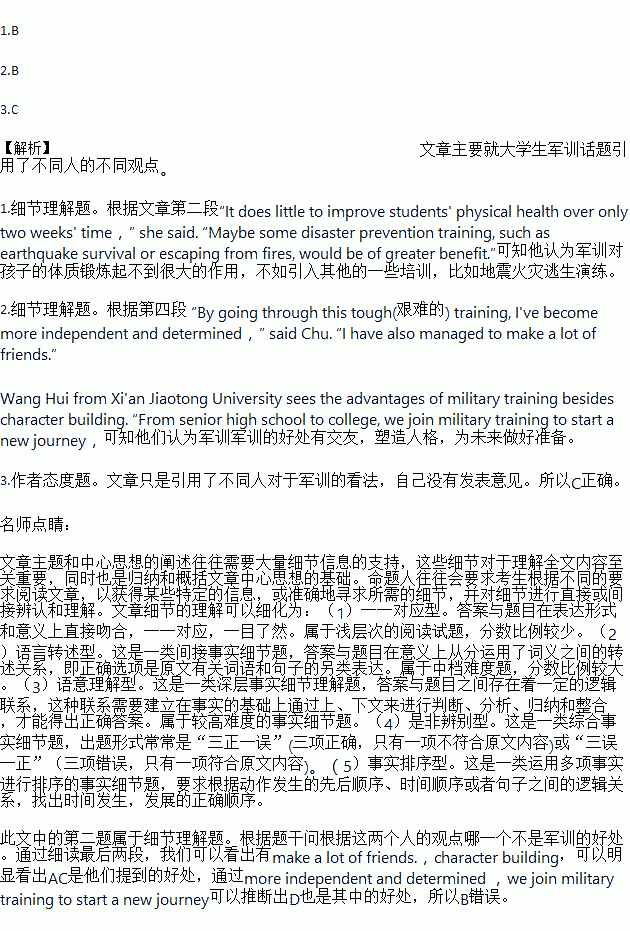题目内容
September is a difficult month for all students as they return to continue their education, but for high school and university green hands, it is not just the heavy study tasks they need to follow. They will also go through military(军事的) training, which aims to help students improve their health and help them adapt to college life. The Ministry(部) of Education requires that universities should carry out at least 14 days' military training for freshmen(新生).
Hou Zhengfang, an education expert, questioned the benefits of military training. “It does little to improve students' physical health over only two weeks' time,” she said. “Maybe some disaster prevention training, such as earthquake survival or escaping from fires, would be of greater benefit.”
A freshman who fainted(晕倒) during training said that many students, especially girls, are unwilling to train in direct sunshine. “For me, military training is physically challenging and even damages my health,” said the 19-year-old.
Although Chu Jinjing, a Tsinghua University freshman, did feel some discomfort while training in the heat, the 18-year-old did recognize the benefits of military training. “By going through this tough(艰难的) training, I've become more independent and determined,” said Chu. “I have also managed to make a lot of friends.”
Wang Hui from Xi'an Jiaotong University sees the advantages of military training besides character building. “From senior high school to college, we join military training to start a new journey,” said Wang. “I would feel a bit incomplete without it.”
1.Hou Zhengfang might advise the Ministry of Education to ________.
A. cut students' heavy study tasks
B. introduce other trainings for students
C. encourage students to work out
D. shorten the time of military training
2.Chu Jinjing and Wang Hui mentioned all the benefits of military training EXCEPT ___.
A. developing friendship
B. improving students' health
C. building character
D. preparing students for college
3.According to the passage, what is the author's attitude towards military training?
A. He supports it very much.
B. He is strongly against it.
C. He doesn't express his own opinions.
D. He thinks it's good for his health.


 C. turn out D. get around
C. turn out D. get around tterflies! I thought abou
tterflies! I thought abou t our ______. She was happy to catch the butterfly and happy to see it go. Maybe she was right. Butterflies ______ nothing but happiness. Maybe butterflies aren’t exactly the ______ to happiness, but there is something to be said about the simple things in ______ . And with that, I started to write.
t our ______. She was happy to catch the butterfly and happy to see it go. Maybe she was right. Butterflies ______ nothing but happiness. Maybe butterflies aren’t exactly the ______ to happiness, but there is something to be said about the simple things in ______ . And with that, I started to write.
 on I noticed him.
on I noticed him.